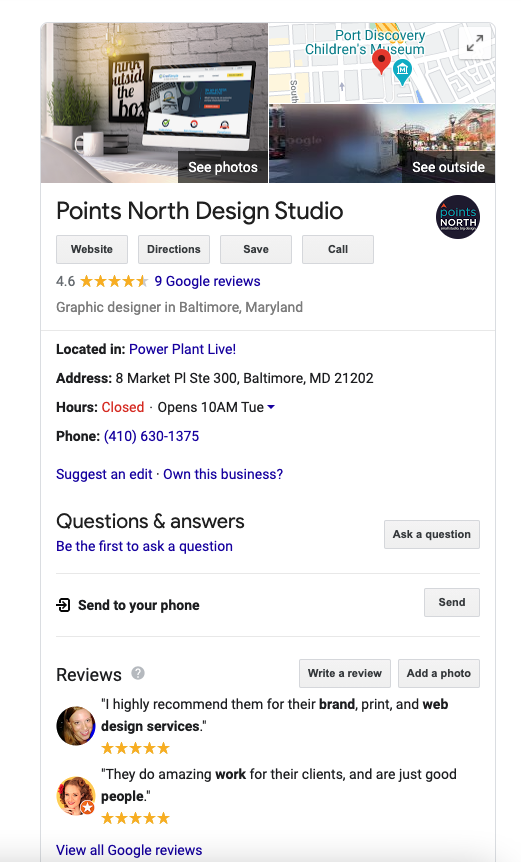Regardless of the type of B2B business you’re in, there’s something to the idea of making a name for yourself locally. Even if you don’t offer a physical service or goods, there are numerous reasons to set aside some marketing dollars and capacity to target a local audience.
Before we jump straight to the tips for targeting your local audience, here are a few not-so-elusive reasons why this is a good idea:
Put marketing dollars to work where your biggest network is.
You have business partners, clients, friends and family locally. You are part of your community in a number of ways and you should leverage these community connections. And when offering a reference or asking clients for referrals, you may actually have some contacts in common, especially if your clients and prospects all work within the same industry.
People like to work with local partners.
This can be a big factor for a number of companies when choosing a vendor partner. Some companies often prefer to work with local businesses due to local pride, ease of in-person meetings (eventually), or even shared cultural understanding and experiences. Having this leg up will actually make your job easier.
Search results are often location-based, even if you don’t specify your location.
Whether you search for “sports apparel” or “PR agency,” the first set of organic search results (the results that start after the ads) are map-based results in your area.
Now that we have a few simple “whys,” let’s move on to the “whats.”
4 Ways to Apply Your Marketing Dollars to Reach a Local B2B Audience
Each of these options varies in terms of effort, cost and skill set. We don’t expect that everyone will be an expert in all of these areas but one key to being an effective business and marketer is to know your strengths and hire (whether contractors or full time) to fill in the gaps.
1. Set up a Google My Business page
We’ve all seen these pages — you search google or google maps, and up pops a robust (or not…) listing for a local business. These can be useful on a number of fronts: If you take the time to fill them out, they will show up in search results. You can ask (and incentivize) clients to give you reviews. It doesn’t take more than a few to boost your presence. Social proof such as this is very important.
Bonus: If you have a high-profile local client, make sure they are on your list of clients you ask to fill out a review.
You can also manage your brand image by ensuring you keep the hours and contact information up to date (including holiday hours).
Cost: Free to create and fill out. The only potential cost is if you offer a thank you gift to clients that provide reviews.
2. Invest time in SEO with location-based keywords
Search engine optimization (SEO) is a “free” long-term — but vital — strategy for any organization. For a large segment of B2B companies, content is already a key part of your strategy. Take what you’re already doing and turn it into SEO-optimized pages and blog posts on your website and add in local keywords. If you don’t yet have a strategy, this is a great way to start.
A few examples:
- A blog post listing the local businesses in your field. Make this a round-up of local businesses similar to yours. While this seems counterintuitive, it’s a great way to get ranked in search results and, by doing so, ensuring you are discovered and on the list of companies for your audience to research. Make sure to showcase your work and customer testimonials, as well as provide a call to action on the page.
- A blog post that’s relevant to both your target audience and a local topic or event.
- A static (non-blog post page on your site) that talks about the work you do locally.
- Any other locally relevant topics that your audience might search.
Not an SEO expert? Don’t know where to start? We can help! Whether you want to outsource the technical setup, keyword research and the copywriting — or all a mix thereof, we can help.
3. Find relevant panels and events where you can showcase your knowledge
Position yourself as a thought or domain leader by speaking on panels or local events. For example, if you’re a marketing agency, connect with your local VC firm and offer to share your knowledge with their audience. This helps facilitate a relationship with an ongoing referral source and also your target audience. And with everyone working remotely, while your focus may be local brand awareness, events have the added benefit of attracting broader audiences since in-person attendance is currently irrelevant.
You can also leverage this session for your marketing efforts before and long after the event has ended. Promote the event on social media and turn the content into a series of blog posts that you can use in your email and social marketing.
4. Leverage your LinkedIn network
Referrals and introductions are great for business. LinkedIn provides the best way to discover and leverage mutual connections. People are often more than happy to make an introduction or a referral — especially those who are most active on LinkedIn. And if your LinkedIn presence is strong (e.g., you’re regularly sharing content and interacting with your network), it makes the introduction that much easier. It never hurts to ask.
Whether you tackled all or some of these ideas in the past, each needs a refresh and some attention every once in a while. Take a few minutes to think about which of these ideas to (re)focus on this week. And if you have any questions, we’re here to help.



